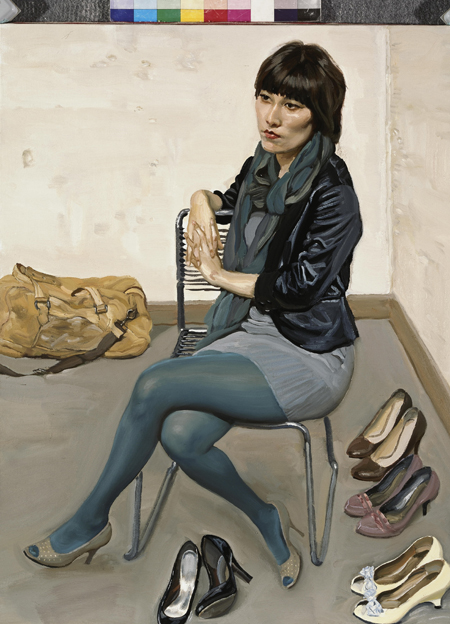
 |
|
Stockings and shoed, 2009, oil on canvas, by Chen Danqing. Photo provided to China Daily |
The 45-year-old says his preference for gray came from childhood memory.
"Gray is exquisite, ambiguous and full of possibilities," Mao says, adding that gray has the power to touch the soul.
Although painting from his own perspective, Mao admits his strong embrace of the classical. He reveres the history of art, and doesn't believe any kind of originality that can appear without tradition.

That is why he seeks inspiration every day from European masters such as Vermeer (1632-1675) and Velazquez (1599-1660), hoping to extract something new and valuable.
The other Dutch artist, Jan Worst, applauds Mao's effort: "Mao's works are oil paintings, but very Chinese."
Akkerman observes that if his own works are shouting to the viewer and Chen's works are talking, then Mao's works are whispering.
As for the art of his countryman Worst, Akkerman prefers the word "dreamlike".
Worst's works reflect the long Dutch tradition of interior painting as well as nostalgia, as he presents 18th-century-style libraries along with handmade books, exquisite furniture and delicate interior decorations. A warm tone, like a glow from a fireplace, also gives these paintings a classical grace.
However, none of these is a direct copy from an existing scene, Worst points out. The Dutch artist plays with all kinds of classic elements and puts them together in his own way.
In a bizarre touch, he places modernly dressed and even naked women in the libraries. Some of them are sitting on desks.
"Woman is an essential subject for the traditional painting, and still is," Worst says. "Instead of real models, my inspirations came more from fashion magazines and posters. That's how traditional interior art adapts to today's context."
The 60-year-old refuses to decode his works, insisting he's a painter, not a storyteller. "There is no password," he insists.
"The Chinese fine-art world keeps wondering if there are still realism painters working in Europe. I believe Jan Worst has answered the question," Chen says.
"Only when contemporary art takes root in the womb of tradition, can it excite bigger energy," says Today Art Museum director Hsieh Su-chen. "This exhibition of modern portraits and interiors sets a good example."
Contact the writer at zhangzixuan@chinadaily.com.cn.
Related photos:
|
|
|
|